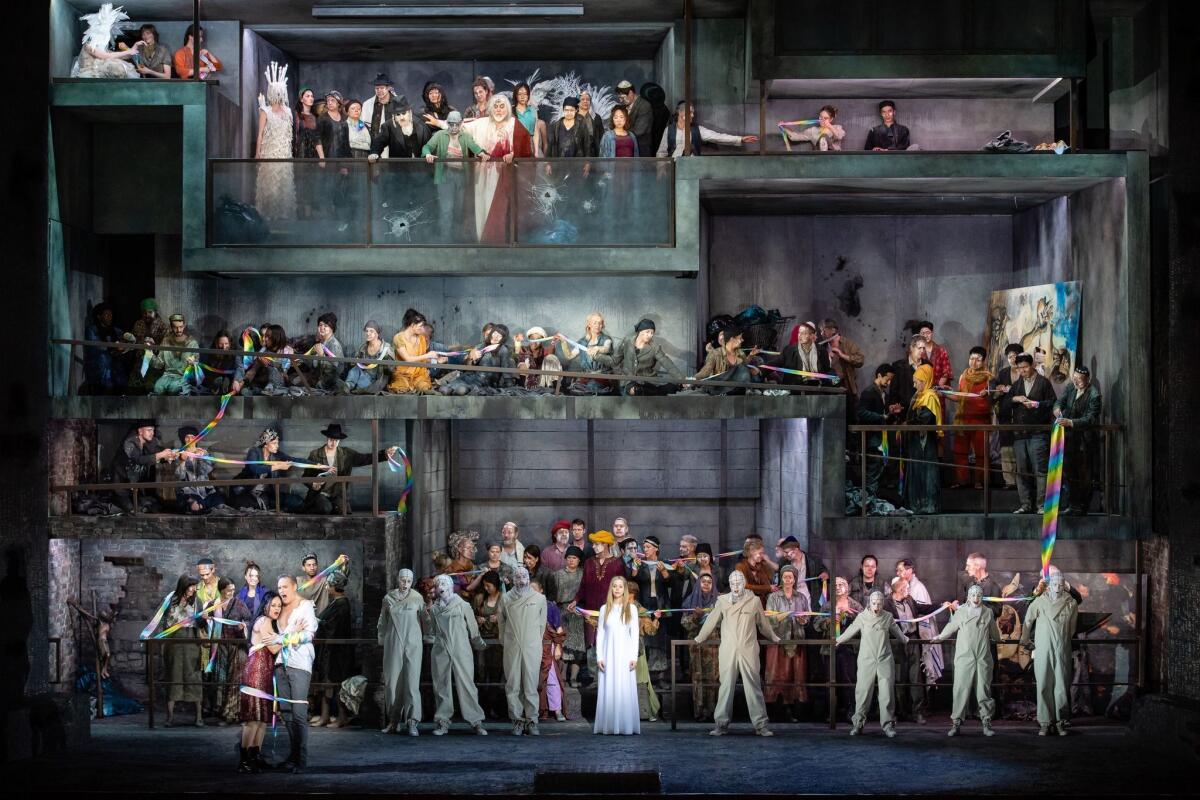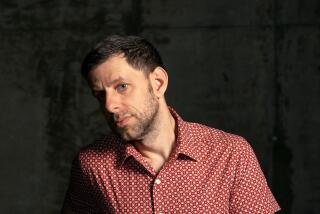Critic’s Notebook: Want the West Coast’s best in opera? You have to go to Europe
- Share via
Reporting from Berlin — How would have Yuval Sharon’s bewildering new production of Mozart’s “The Magic Flute” gone over in Los Angeles? That was the first thing that crossed my mind as I walked out of the opera house and into a Berlin rain on a frigid day in March.
Sharon, the ever disruptive artist-collaborator of the Los Angeles Philharmonic and artistic director of the experimental opera company the Industry, has made L.A. the locus for opera reinvention in America and gets national attention for each of his grand experiments. But America’s major opera companies presumably view Sharon as a troublemaker, whereas Berlin’s most important opera company was willing to entrust this cheeky young American with work that is a national pastime in Germany.
“The Magic Flute” is taught to schoolchildren, and parents bought tickets long before scabrous opening-night reviews warned of a manga-meets-Mozart production that was a disaster on every level, musically and theatrically. But the kids wound up loving what the European critics loathed. Stylish young couples cheered almost as enthusiastically, drowning out a boo or two from the inevitable, grumpily reverent “Flute” follower.
Unless American opera companies get a very loud and insistent wake-up call, we’ll never see 18th century opera characters disguised as Astro Boy and Girl wondrously flying around the stage, eventually gaining surprisingly touching humanity. We’ll never know what effect that would have on our youth, to say nothing of the perpetuation of the art form itself.
This is not an idle curiosity. Over two recent weeks in Europe, night after night I attended operas that were in one way or another West Coast-centric. Most have little chance of crossing the pond. Yes, we make and mount great opera in this country. Los Angeles Opera can take justifiable pride in having premiered Ellen Reid’s “prism,” which just won this year’s Pulitzer Prize in music. But this is small-scale work, and it makes missing the bigger, more ambitious picture all the more frustrating.
The original reason for my trip was to report on the 90th birthday concert for Frank Gehry that pianist and conductor Daniel Barenboim put on in the Pierre Boulez Saal, the hall that the L.A. architect had designed for the Barenboim-Said Akademie in Berlin. Then I noticed that the next night there was a performance of Sharon’s “Magic Flute.” The night before, at Komische Oper down the road, was director Barrie Kosky’s re-conceived and revelatory Brechtian production of “West Side Story” that was supposed to come to Los Angeles Opera until union officials put the kibosh on it because it relies on too much stage fog.
There was more in Berlin, Hamburg, Amsterdam and Brussels — vital and innovative music theater that involved our artists. I had come upon an ad hoc festival that, in the most artistically logical and environmentally responsible worlds, would be within driving distance of anyone in L.A.
This is not coincidence. When it came to opera and music theater in the 1970s and 1980s, if you wanted to keep up with America’s most influential composers (notably John Cage, Morton Feldman and Philip Glass), choreographers (Merce Cunningham and Mark Morris) and directors (Robert Wilson and Peter Sellars), you scoured the news from Europe. A few big events in the 1980s and 1990 — the L.A. Olympic Arts Festival and its follow-up Los Angeles Festival, New York’s Pepsico Summerfare and the recently disbanded Lincoln Center Festival — brought some of the work back home. But America no longer has any festival on this scale.
The Brooklyn Academy of Music was a reliably importer and remains so, if on a smaller scale, and what would we do without the Center for the Art of Performance at UCLA or REDCAT downtown? American opera companies do now and then stick their toes into new and adventurous work, so long as it’s not too challenging or controversial or chance-taking or expensive. But these are the exceptions. That I could stumble on so much more in a two-week period overseas suggests a whole different order of things.
The reasons are varied. Money remains No. 1. We lack the government support for the arts taken for granted in so many places, from St. Petersburg to Abu Dhabi. That is lessening in certain countries, with the British notably singing the blues. But they find ways to proceed anyway, especially when what they are peddling is imagination.
The shining proof that vision sells is the Los Angeles Philharmonic, which has become the best-funded and most financially stable orchestra in America, and maybe the world, by being the least risk adverse.
What are we missing in opera? A good place to start might be Austrian composer Olga Neuwirth’s “The Outcast,” which I heard in Hamburg’s imposing new Elbphilharmonie. Her wildly inventive feminist take on “Moby-Dick” has an English libretto by Barry Gifford, the L.A. novelist and screenwriter.
Neuwirth based her startlingly fresh first opera in 2003 on Gifford’s screenplay to David Lynch’s “Lost Highway,” which earlier this season had a new production by Sharon at Frankfurt Opera (one he hopes to re-create for the Industry in 2022). She is also the composer of the opera “American Lulu.” Yet there has never been a professional production of Neuwirth’s “American” operas in this country.
From “Call me Ishmael” — her very first words in “The Outcast,” the narrator brings a whole new meaning. “I have to masquerade as a boy to be hired as a sailor,” Ishmaela explains, never having been comfortable as a woman. Ahab, Queequeg, Starbuck and Pip are all there and true to their Melvillean natures, but so is the cantankerous writer himself. Old Melville sits at his desk mistrusting power, decrying capitalism and its pillaging of oceans and seeking the meaning of life in the self, as Ishmaela must in her identity.
This is the “Moby-Dick” for our times in numerous ways — philosophical, societal, personal and interpersonal, governmental, spiritual, institutional, religious, political and environmental. And musical. Through electronics, an original use of instrumental colors (Ilan Volkov conducted the excellent Vienna ORF Radio Symphony Orchestra) and her startlingly effective writing for voice, Neuwirth makes it all matter.
All the more remarkable was the next night in Amsterdam, where I caught up with the Dutch National Opera’s newly revised version of John Adams’ “Girls of the Golden West.” Just as “The Outcast” recasts “Moby Dick” from the point of view of women and people of color, Adams’ latest opera, with a libretto and production by Sellars, takes the same approach to the California Gold Rush. “Girls of the Golden West,” moreover, is set in 1850, the very year Melville was writing “Moby-Dick.”
San Francisco Opera gets full credit for commissioning and premiering “Girls of the Golden West” in 2017. The need for revision is only natural for a work of such ambition and seriousness. The outstanding cast and conductor (L.A. Opera resident conductor Grant Gershon) were the same. But my first question to the Dutch National Opera after the final curtain was whether the sets were new.
No, the originals were crated and shipped from America. In San Francisco, they looked tacky and unfinished. In Amsterdam, they created a resplendent aura. The difference was that San Francisco’s tight budget did not accommodate lighting designer James F. Ingalls’ proper rehearsal, and light made all the difference in drawing in an audience from the get-go and changing the whole feeling of the show. One lesson from Europe is don’t skimp. It’s not worth it.
Here’s another hard-to-believe quirk of chance. Mark Grey, the exceptional sound designer of “Girls,” had his opera “Frankenstein” premiering at one of the historically most imaginative European opera companies, La Monnaie, in Brussels. Like Adams, Grey is a Bay Area composer and is a familiar figure at Walt Disney Concert Hall, where he has created sound designs for Adams’ theater works and his own pieces performed by the L.A.Phil and Master Chorale.
We’ve been long overdue for a major “Frankenstein” opera, and this futuristic version filled the bill. The English libretto by Spanish playwright Júlia Canosa i Serra proved at times heavy-handed, but her update of Mary Shelley’s 201-year-old groundbreaking science-fiction classic to a thousand years into the future is relevant. A fossil of the monster is found trapped in ice and brought back to life. Thanks to the ability to materialize the monster’s memories, the creature is still capable of wreaking havoc, and the opera becomes a gripping metaphor for the intersection of machine and humanity.
Grey’s use of electronics aurally modernized the old opera house, and his warmly modernist score compassionately accentuated Topi Lehtipuu’s frightening portrayal of a monster discovering the meaning of emotions. This “Frankenstein” illumines the ultimate “outcast” and could also be interpreted as a metaphysical corollary to Sharon’s “Flute.”
There is no word of “Frankenstein” coming to America. (The production can be screened for a limited time on operavision.eu.) But Grey and Canosa i Sierra are writing a chamber opera, “Birds in the Moon,” that will have its premiere in Berkeley next year. And speaking of Berkeley …
Let’s talk for a minute about Kent Nagano, who transformed a one-time collective of disgruntled music students, amateur musicians and stray hippies into the significant cultural institution that became the Berkeley Symphony and who was the first music director of L.A. Opera.
Nagano has next to no presence in the U.S. these days, although he still maintains a residence in San Francisco and is the highly successful music director of the Montreal Symphony. In Europe, he is one of the most important figures in opera.

My recent trip included a pair of newsworthy opening nights, both thanks to a behind-the-scenes Nagano.
Staatsoper Berlin had a new production of Jörg Widmann’s extraordinary grand opera “Babylon,” which Nagano had commissioned when he was head of the Bavarian State Opera in Munich. The Hamburg State Opera, where Nagano is music director, was premiering a production of Verdi’s “Nabucco” directed remotely by Kirill Serebrennikov, who is under house arrest in Moscow after reputedly running afoul of the Kremlin.
Yet back home, L.A. Opera has lost much of its moxie since Nagano’s departure a decade ago. The company ignores not only Sharon but also Sellars, two of the world’s most notable directors; the latter also a longtime UCLA professor. Rather than mount Sellars’ revelatory production of “La Clemenza di Tito,” created for the Salzburg Festival two years ago (check it out on medici.tv), which gave new currency to Mozart’s neglected last opera, L.A. Opera recently made a new production crammed with clichés that sank fine singing and conducting.
It’s an old story that you have to make it first somewhere else before you can be taken seriously at home. But at the moment, we have a plethora of prodigal sons and daughters we foolishly ignore, thinking we either can’t afford them or aren’t ready for them, when it is just the opposite.
SPRING CLASSICAL PICKS: Hannigan’s Ojai, “Central Park Five” and more »
More to Read
The biggest entertainment stories
Get our big stories about Hollywood, film, television, music, arts, culture and more right in your inbox as soon as they publish.
You may occasionally receive promotional content from the Los Angeles Times.











